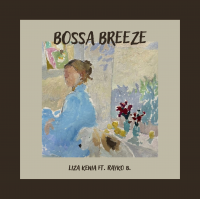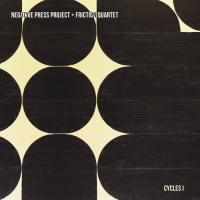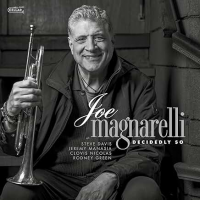Home » Jazz Articles » Album Review » Various artists: Alligator Records: 50 Years of Genuine ...
Various artists: Alligator Records: 50 Years of Genuine Houserockin’ Music
Almost alone of the mid-major labels that formerly thrived in the 1980s and '90s by specializing in non-mainstream styles of music, Alligator has managed to navigate stunning changes in the music business—from the vinyl of LPs and 45s to cassettes and CDs, and then, most recently, the virtual collapse of the retail record business and wholesale pivot to online digital sales.
While those other specialty independents—from the folk label Rounder to the bluegrass-oriented Sugar Hill, the Bay Area rock label Fantasy to the Midwestern jazz label Telarc—were merging or being bought, Alligator has soldiered on doing its own thing, its own way.
That ability to chart its own course may largely be attributed to what's found on this new 3-CD box set: Alligator did for late-20th Century blues what labels like Blue Note, Verve, Riverside and others did for mid-century jazz: Not only gave it a home, but celebrated it. Loved it, really.
Just as Norman Granz was the visionary and driving force behind Verve, and Alfred Lion held that same role at Blue Note, Alligator is the lifelong passion of Bruce Iglauer—who founded Alligator for the singular purpose of recording the late Hound Dog Taylor when Iglauer's employer at the time, Delmark Records, declined.
Soon, Iglauer was recording other southside Chicago blues artists like Koko Taylor, Big Walter Horton, and Son Seals. By the time his 10-year anniversary rolled around, Alligator was the pre-eminent blues label—having surged past Delmark and Arhoolie in sales and prominence.
It wasn't just that Iglauer signed some of the better, more popular and creative musicians on the blues scene: The quality of the recordings was as good as anything the major labels were doing. Releases on Alligator sounded clean. And Iglauer promoted the heck out of his releases.
Not only did Alligator issue some of the more popular blues albums, but Iglauer helped promote the blues as a whole in other ways. He became a major supporter of Living Blues magazine, taking out a full-page ad every month in the form of a letter from Iglauer to fans of the bands he was recording.
Other labels sprang up to take part in this blues renaissance that Alligator had helped to spur: Antone's, Earwig, Black Top. While all helped document and promote the blues, none could eclipse Alligator. (Of all the major competitors that came along after Alligator, only Earwig has also been able to remain independent through all the industry changes. Delmark and Arhoolie, which predated Alligator, also remains active, vital—and independent today.)
Alligator has issued similar anniversary collections at its 20, 25, 30 and 40-year marks, and the 50th anniversary set does include some duplicates found on the earlier compilations. Plus, serious, longtime blues collectors will already have many of these tracks on the original releases by the artists. But that doesn't mean this isn't worth picking up: The 58 tracks on the CD version are one of the best single-label compilations you're likely to find. It's not a definitive history of the blues, but it's a pretty darn good overview of the last 50 years, telling the Alligator story in roughly chronological order, from Hound Dog Taylor's "Give Me Back My Wig" from his—and the label's—1971 debut, through other '70s stalwarts like Koko Taylor (no relation), Albert Collins and Seals, up through the present.
The '80s brought the groundbreaking, Grammy-winning Showdown! (1985)—one of the first "summit" records that assembled a cast of multiple stars for a loose, informal session: This one featured Collins, Johnny Copeland and a young, not-yet-famous Robert Cray.
Showdown! changed Alligator's fortunes, and made all-star summit albums de rigeur for everyone from John Lee Hooker to B.B. King, and even blues-rock star Carlos Santana.
Early roots figures like Lonnie Mack and Roy Buchanan found a home at Alligator in the '80s and are represented here, as is Johnny Winter's three-album return to the straight blues he preferred to the rock that had made him a guitar hero.
But what defined Alligator in the 1980s and '90s were homegrown stars like Smokin' Joe Kubek, Little Charlie & The Nightcats, and Lil' Ed & The Blues Imperials—who either hadn't recorded before Alligator signed them, or who achieved their initial national fame on the label.
Not every artist spent their entire career on Alligator—but an awful lot of established, influential blues musicians did find their way to Alligator for at least an album or two: Marcia Ball, Mavis Staples, Steady Rollin' Bob Margolin, Billy Boy Arnold, Roomful of Blues, Cephas & Wiggins, Long John Hunter, Elvin Bishop, James Cotton.
And while Alligator's roots and much of its catalog are grounded in post-war Chicago blues, Iglauer and Alligator have never gotten stuck into any one style: Staples' is a gospel and R&B singer, Cephas & Wiggins' brand of blues was in the Carolinas' Piedmont style, Hunter and Clarence Gatemouth Brown hailed from Texas, Kenny Neal from the bayous of Baton Rouge. And CJ Chenier took over his father, Clifton Chenier's, zydeco band when his father passed on.
Even some of the acts Alligator "discovered" were breaking new stylistic ground: Kinsey Report had as much hard rock in its music as blues; Michael Hills' Blues Mob was closer to Living Colour than to Muddy Waters; Australia's Dave Hole seemed to be channeling Stevie Ray Vaughan through Aerosmith's prism. And Shemekia Copeland, daughter of the late Johnny Copeland, has always had a sound based on the blues but reaching out into soul, pop and rock—with the kind of crossover appeal of a Bonnie Raitt or Robert Cray.
Even as the music industry has changed, with music shops and distributors giving way to mobile apps, Alligator hasn't just survived—but continues to sign new artists, to carry the blues forward.
In the last decade, Alligator has signed up-and-coming artists including Selwyn Birchwood, the Nick Moss Band, Christone "Kingfish" Ingram, and Toronzo Cannon.
If there's a hole in this collection, it's the absence of any of the reggae albums Alligator branched out into in the early 1980s. But those are all out of print, and it may be that Iglauer gave or sold the rights back to the artists when he got out of the reggae business. Still, some major reggae heavyweights issued albums on Alligator, including The Abyssinians, Joe Higgs, Pablo Moses & The Handcart Band and The Skatalites.
What this collection makes most clear is that for all the hall of fame glamor attached to many of the tracks found here, Iglauer isn't done quite yet—and as long as Alligator is around as an independent label, it's likely to be the standard by which blues albums are judged.
Track Listing
DISC 1: Give Me Back My Wig (Hound Dog Taylor & The Houserockers); I'm A Woman (Koko Taylor); Have Mercy (Big Walter Horton with Carey Bell); Somebody Loan Me A Dime (Fenton Robinson); It’s My Fault, Darling (Professor Longhair); Telephone Angel (Son Seals); Lights Out (Johnny Winter); Blue Monday Hangover (Albert Collins); Little Car Blues (James Cotton); The Dream (Albert Collins, Robert Cray & Johnny Copeland); Pawnshop Bound (William Clarke); Ridin' the Blinds (Live) (Lonnie Mack); Cold Lonely Nights (Live) (Lonnie Brooks); Soul Fixin’ Man (Live) (Luther Allison); Got My Mojo Working (Clarence "Gatemouth" Brown); Sloppy Drunk (Saffire–The Uppity Blues Women); That Did It (Roy Buchanan); Keep On Lovin' Me, Baby (The Paladins).
DISC 2: Love Disease (Michael Burks); I'm A Blues Man (Kenny Neal); Run Myself Out of Town (The Holmes Brothers); Jump Star (Little Charlie & The Nightcats); I'm Still Leaving You (Katie Webster); Don't Lose My Number (Smokin' Joe Kubek & Bnois King); Corner Of The Blanket (The Kinsey Report); I Got A Rich Man's Woman (Carey Bell); Au Contraire, Mon Frere (C.J. Chenier & The Red Hot Louisiana Band); There's A Devil On The Loose (Mavis Staples); Presumed Innocent (Michael Hill's Blues Mob); Not What You Said Last Night (Steady Rollin' Bob Margolin); Man Of Considerable Taste (Billy Boy Arnold): Ain't Seen My Baby (Cephas & Wiggins); Marfa Lights (Long John Hunter); Phone Line (Dave Hole): Josephine (Eric Lindell); I Won't Do That (Joe Louis Walker); That's What Love Will Make You Do (Janiva Magness); Going Back to Alabama (The Siegel-Schwall Band); Why Don’t You Live So God Can Use You? (Corey Harris & Henry Butler).
DISC 3: Party Town (Marcia Ball); What You See Is What You Get (Lil' Ed & The Blues Imperials); In A Roomful Of Blues (Roomful of Blues); Blue and Lonesome (Billy Branch & The Sons Of Blues); Outside of This Town (Christone "Kingfish" Ingram); Clotilda's On Fire (Shemekia Copeland); The Longer That I Live (Curtis Salgado); Living In a Burning House (Selwyn Birchwood); Midnight Hour Blues (Elvin Bishop & Charlie Musselwhite); Ain't No Fun (When The Rabbit Got The Gun) (The Cash Box Kings); Make It Back To Memphis (Live) (Tommy Castro & The Painkillers); A Woman (Live) (JJ Grey & Mofro); I'm Running (Rick Estrin & The Nightcats); You Didn't Think About That (Coco Montoya); Ice Cream In Hell (Tinsley Ellis); You Won't Have A Problem When I'm Gone (Chris Cain); Too Late (Guitar Shorty); The High Cost of Low Living (The Nick Moss Band featuring Dennis Gruenling); The Chicago Way (Toronzo Cannon).
Personnel
Koko Taylor
vocalsProfessor Longhair
pianoJohnny Winter
guitar, electricAlbert Collins
guitar, electricJames Cotton
harmonicaRobert Cray
guitar, electricMarcia Ball
pianoHenry Butler
pianoShemekia Copeland
vocalsCharlie Musselwhite
harmonicaJJ Grey & Mofro
band / ensemble / orchestraCoco Montoya
guitarAlbum information
Title: Alligator Records: 50 Years of Genuine Houserockin’ Music | Year Released: 2022 | Record Label: Alligator Records
Tags
PREVIOUS / NEXT
Various Artists Concerts
Support All About Jazz
 All About Jazz has been a pillar of jazz since 1995, championing it as an art form and, more importantly, supporting the musicians who make it. Our enduring commitment has made "AAJ" one of the most culturally important websites of its kind, read by hundreds of thousands of fans, musicians and industry figures every month.
All About Jazz has been a pillar of jazz since 1995, championing it as an art form and, more importantly, supporting the musicians who make it. Our enduring commitment has made "AAJ" one of the most culturally important websites of its kind, read by hundreds of thousands of fans, musicians and industry figures every month.




































